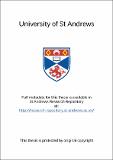The Mamluks and the Armenian kingdom during the reigns of King Hetùm II (1289-1307)
Abstract
This dissertation describes the history of the Armenian kingdom in Cilicia, and the relations between the Mamluks and the Armenians, especially during the period between 688AH/1289CE and 707/1307. The conflict between the Armenians and the Mamluks was part of a wider conflict between the latter and the Mongol Ilkhans. Therefore, this work also looks at the relationship between the Mongols and the Armenian kingdom, and Armenian involvement in the Mongol campaigns against Syria. To these ends, the thesis demonstrates the use of Arabic sources from the Mamluk Sultanate, in addition to those French and Armenian sources already well-known to historians of the kingdom. The Arabic sources can be used to correct, contrast or clarify these conventional sources, and also to give information on events not covered significantly by them. The Arabic historians tell us a surprisingly large amount about the turbulent internal affairs of the kingdom, and its relationship with the Ilkhans. The first part of the thesis is concerned with the period before 688/1289, introducing the region and its political units. It looks in more detail at the period following the rise to power of the Mamluks, and especially after their victory over the Mongols at 'Ayn Jalut in 658/1260. The Mamluk Sultans sought to punish the Armenian kingdom for its involvement with the Mongol invasions of Syria, until the Armenians agreed to a truce and, in effect, to subject status. The main section deals with the period of the several reigns of Het'um II, until his murder by a Mongol general in 707/1307. This period covers the end of the Crusader States; several attempts by the Ilkhans to conquer Syria; and the beginnings of the Mamluk conquest of the Armenian kingdom. The Armenians became increasingly dependent on the unreliable Mongols, and increasingly vulnerable to Mamluk interference.
Type
Thesis, PhD Doctor of Philosopy
Collections
Items in the St Andrews Research Repository are protected by copyright, with all rights reserved, unless otherwise indicated.

